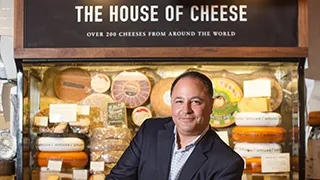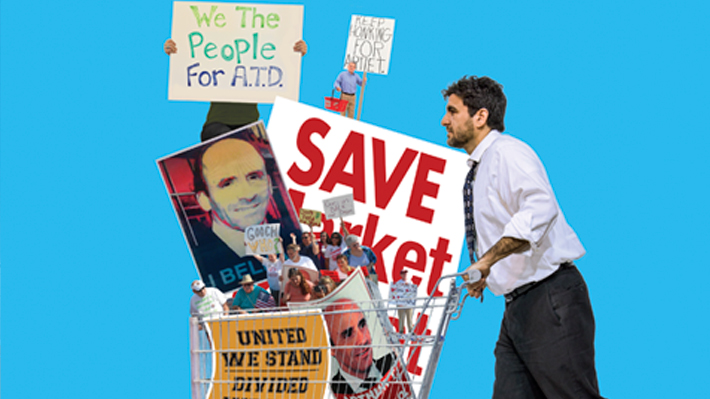
Market Basket: A Case Study for the Ages
Imagine employees, customers, and suppliers so loyal to the CEO of a multi-billion-dollar company that when he gets fired, they gather by the thousands to protest.
When I mention to an acquaintance that this scenario is the storyline for my next book, she tells me she didn’t realize that marketing professors wrote novels. “It’s a true story,” I tell her. It’s good to say it out loud. I have to remind myself once in a while as well.
I had known about this supermarket chain called Market Basket since my college days. It is a haven for bargain shoppers like my father and mother-in-law, who have tremendous loyalty, not only because Market Basket has the lowest prices around, but also because it has friendlier service than most other chains. The family-owned corporation is one of the country’s fastest growing supermarket chains.
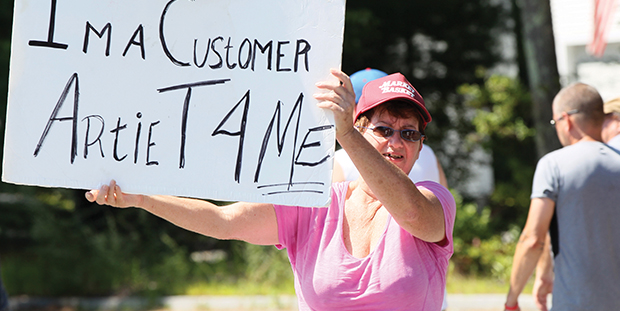
Customer support. Photo: Getty Images
The two cousins had been locked in a battle for control of the company for years, but few were prepared for one cousin to oust the other altogether. The stakes were enormous, and the battle pitted one billionaire against another. It was the stuff of a TV series.
The fight made front-page news, but lurking behind the scenes was something even more interesting. There was a growing movement of Market Basket loyalists who loved the company’s culture, and came to view Arthur T. as embodying the best of that company’s values. The people of Market Basket weren’t going to allow someone to take away their CEO and way of life.
When he was finally fired in June of 2014, people banded together in protest. Warehouse workers walked off the job, cutting off supplies to stores. Associates at stores demonstrated on street corners and in local parades; they rented buses with their own money so they could attend rallies of more than 10,000 people in Tewksbury, Mass. Customers boycotted; in fact, some would return to Market Basket stores after a large purchase at a competitor so they could tape their receipt to the front door, just to send a message to the board of directors. Suppliers stopped shipments, picketed alongside associates, and wrote letters to lawmakers and newspapers.
For six weeks during the summer of 2014, the chain was essentially shut down. Store shelves were empty, sales were down more than 90 percent. Stakeholders of all stripes were determined to protect the culture they loved from what they saw as marauding corporate profit-takers.
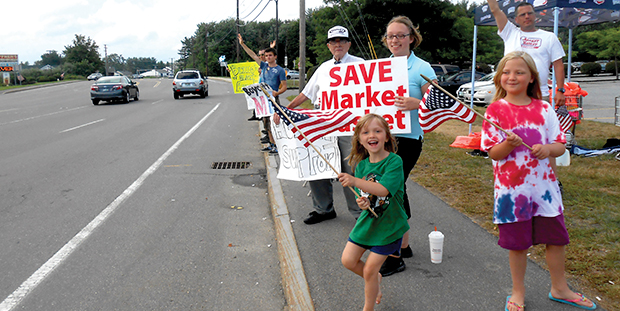
Thousands of employees and their families took to the streets to demonstrate the firing of their beloved CEO.
I was drawn to the story immediately. Much of my research examines how people can become attached to a company when they believe that it shares their values. I’ve documented this effect in many studies, but never encountered such a dramatic example. This was the only case I had ever seen where so many stakeholders came together because they felt that the company’s values were under attack. Here were thousands of people putting their jobs on the line to protect the company and its CEO.
I started attending the rallies to learn what was motivating associates and others. The crowd was filled with employees (they call themselves “associates”) ranging from teenagers for whom this was their first job, retirees working part-time, managers, office workers and even executives. They came from different backgrounds and ethnicities. Loyal suppliers and customers joined in. The group was diverse yet remarkably cohesive. Participants felt as though they were an extended family.
What united them mostly was the unique brand of social responsibility at Market Basket. Sure, Market Basket gives money to charity. But it serves the community in other, more subtle ways. A large portion of its clientele are low- or moderate-income families. These families say they save up to $4,000 a year by shopping there. Associates tell me that Market Basket is more than a store, it provides a service to the community by helping people put food on their tables and lead better lives. Protecting Market Basket for some was a way to look after the region.
Associates also say the company has a culture of respect, where associates get a fair wage, profit-sharing bonuses and opportunity for advancement. It’s the sort of place where many want to build a career; a rare thing these days. The company only promotes from within. As they like to say, “Your boss did your job.” When freshly minted MBAs come knocking, as they do now more than ever, managers politely tell them they can join, as long as they are willing to start by pushing carts in the parking lot or bagging groceries.
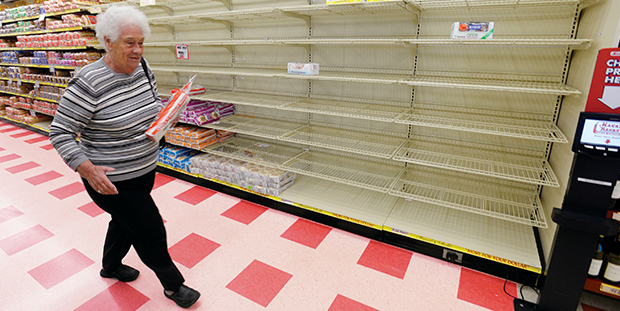
Empty shelves during the boycott. Photo: Getty Images
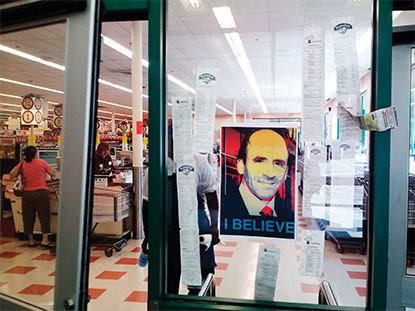
The “I Believe” poster depicts Arthur T. Demoulas. Boycotting customers returned to Market Basket stores to tape their receipts from competitors to the window.
Fortunately, the story has a happy ending: Arthur T. bought out his cousin’s side of the business for about $1.5 billion. He is now CEO again and the company is running on all cylinders. It’s hard to imagine now that this company was in such danger less than a year ago.
This is consistent with much of my own research: That people can form strong attachments to companies and like to reward companies that share their values.
The Market Basket case suggests that we need to rethink many of our most deeply held assumptions about how businesses are run, assumptions that I’ve clung to for far too long in my own classes.
First of all, it challenges our notion of the board’s duties and responsibilities. Most people assume that the board is solely responsible for representing shareholders. In fact, some scholars argue that although directors are elected by shareholders, their fiduciary responsibility is to the company. The Market Basket protest was in part a reaction to the board acting in the interests of shareholders at the expense of customers, associates, suppliers and the community. Loyalists believed that directors had a duty to protect the Market Basket culture, and that some had flouted that duty. It is reason to pause and reconsider to whom a board is responsible.
Second, the Market Basket case also urges us to reconsider a common belief that people are anti-business. For example, the CEO of Whole Foods, has claimed that “business is under attack.” In fact, Market Basket is an example of a truly pro-business movement. Its base of customers and employees are so loyal to the company that they do not want to see it change hands. What they oppose is the greed often seen at other companies, which put profits ahead of people. This is consistent with much of my own research: That people can form strong attachments to companies and like to reward companies that share their values.
Finally, this is a demonstration of how motivated people can become when they believe they are fighting for something larger than themselves. We often assume that people are most motivated by self-interest. In fact, recent research suggests that people can be motivated more by giving than taking; by being selfless rather than selfish. Had this struggle been just about the money, the board could have easily cajoled associates back to work and customers back into stores by providing monetary incentives. That was not the case. These loyalists believed they were fighting for ideals, not a bigger paycheck. Some of the people I spoke with are still paying off credit card debts from that protest. But none have regrets.
The spotlight is still on Market Basket. The Boston Globe named Market Basket associates the “2014 people of the year.” The U.S. Labor Secretary told them, “Your nation is proud of you.” The case has hit a nerve among managers, consumers and scholars. “If you’re a business school,” says John Carroll, a professor of mass communications at Boston University, “this is a case study for the ages.”
It’s a story that’s as inspiring as it is informative. I’m fortunate to be one of the people who gets to tell it.
Daniel Korschun is an assistant professor of marketing at LeBow. His book “We Are Market Basket” will be on bookstores’ shelves this summer. It is available for purchase on Amazon.


